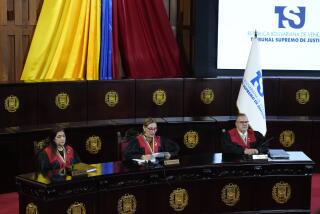Regional autonomy backers claim victory in Bolivia
SANTA CRUZ, BOLIVIA — Two opposing visions of Latin America’s future collided in Bolivia on Sunday as residents of Santa Cruz province apparently voted in landslide fashion against President Evo Morales and his leftist agenda.
Although complete official results were not immediately available, proponents of regional autonomy publicly declared victory, citing exit polls and initial official tallies showing that more than 80% had cast ballots in favor of greater self-government.
“Today we begin in Santa Cruz a new republic, a new state,” Gov. Ruben Costas, an autonomy advocate, told a cheering crowd. “Today in Santa Cruz democracy has triumphed.”
Morales had called the vote an illegal act that threatened to divide the nation. Autonomy advocates deny any intent to split from Bolivia.
The vote became a regional referendum against Morales and his ambitious plans to create a socialist state closely allied with Venezuelan President Hugo Chavez.
Scattered violence and reports of fraud surfaced during the day. Electoral authorities here declared the voting a resounding success, but federal officials in La Paz, the capital, cited irregularities.
The pro-autonomy side was widely expected to win by a large margin amid an opposition boycott and the deep hostility against Morales’ government here.
But the one-sided results from media exit polls prompted jubilant residents to flood the streets late Sunday, setting off fireworks, waving the province’s green-and-white flag and chanting: “Viva la autonomia!”
In La Paz, Alfredo Rada, the minister of government, said violence and irregularities marred the vote. Anti-autonomy activists cited evidence that ballots were pre-marked in favor of the referendum.
“We denounce the fact that some in the media want to falsify the reality, showing a fictitious situation of normalcy,” Rada told reporters.
But officials in this pro- autonomy bastion declared the election clean, and the province’s top electoral official, Mario Orlando Parada, said the scattered violence affected only a small percentage of polling places.
Morales had called the vote a ploy by rich elites averse to land reform and other measures designed to help Bolivia’s poor. News clips showed the president playing a pickup soccer game in the highland capital as residents of subtropical Santa Cruz in the eastern flatlands cast their ballots.
Clashes between pro- and anti-autonomy forces marked the voting in some areas, where the two sides pelted each other with stones, battled with sticks, fired slingshots and tossed firecrackers. Police in riot gear fired tear gas to disperse battling mobs.
News reports indicated at least 20 people were injured and several dozen arrested.
“They want to divide Bolivia and let the rich control everything,” said Pablo Lima, 26, a textile worker who was among hundreds protesting the referendum in the streets of Plan 3000, a poor Santa Cruz neighborhood where many support Morales. “We won’t let them divide our country!”
Nearby, anti-autonomy militants burned ballots apparently snatched from voting places.
Supporters of the measure reported stolen ballots and the sacking of at least one school where voting was scheduled. Some took up positions outside polling places.
Lidia Garcia Solis, 51, stood with two sticks guarding polls at Claudina Thevenet school, along an unpaved, deeply rutted street in the Plan 3000 district. She and others said they were ready to fight to ensure the ballots were safe.
“I’m here to protect our vote, to protect autonomy,” Garcia declared. “We’re tired of people in La Paz taking everything from here and giving us nothing.”
The autonomy measure would give the province more control over natural resources and distribution of taxes. It would also create a regional legislature and police force. All those developments would be a major change in highly centralized Bolivia.
Sunday’s referendum was the first of four scheduled autonomy votes in relatively wealthy lowland provinces, where much of the nation’s agricultural wealth and natural gas reserves are found. Analysts expect similar pro-autonomy victories in coming weeks in the other states, Tarija, Pando and Beni.
The anticipated autonomy wave poses a tough challenge for Morales as he champions a controversial new constitution and other measures widely unpopular here.
The autonomy vote is intended in part to force Morales to modify the proposed constitution and back down on his plans for land redistribution. Backers hope the move will oblige Morales to negotiate with the restive provinces.
--
More to Read
Sign up for Essential California
The most important California stories and recommendations in your inbox every morning.
You may occasionally receive promotional content from the Los Angeles Times.










